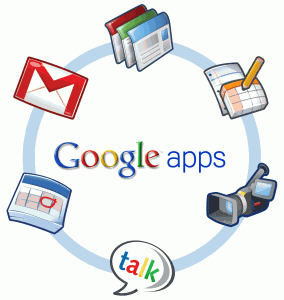 Our faculty and students have adopted G Suite by Google Cloud (formerly known as Google Apps for Education) into their daily routines. At a professional level, this web-based, suite of products has become the backbone of effective communication and has become indispensable in our approach to online collaboration in a fast-paced world.
Our faculty and students have adopted G Suite by Google Cloud (formerly known as Google Apps for Education) into their daily routines. At a professional level, this web-based, suite of products has become the backbone of effective communication and has become indispensable in our approach to online collaboration in a fast-paced world.
In order to cultivate an academic environment infused with technology for both our staff and most importantly our students, we provide access to a G Suite account for students across all grades. Important to note, at lower grades, this account is limited to accessing simple Google Drive tools and also as a way to connect to various assessments that require a G Suite account.
Below are some important questions and answers our community may have about this program.
G Suite Common Questions
Question. What is G Suite?
 Core G Suite by Google Cloud suite includes:
Core G Suite by Google Cloud suite includes:
Gmail: Email access to our staff only along with storage and search tools that help your students find information fast and instant messaging from right inside their accounts.
Google Calendar: Students can organize their schedules and share events and calendars with others.
Google Docs: Share documents, spreadsheets, and presentations. Collaborate in real-time with your team or with your whole school. You can publish final documents to the entire world, too.
Google Sites: Work together to keep related documents, web content and other information in one place, on one site.
Question. Who owns the data that organizations put into Google Apps?
The data which you put into our systems is yours, and we believe it should stay that way. We think that means three key things.
- Google won’t share your data with others except as noted in their Privacy Policy.
- We keep your data as long as you require us to keep it.
- Finally, you should be able to take your data with you if you choose to use external services in conjunction with Google Apps or stop using our services altogether.
Question. Will there be advertisements with Google Apps?
However, if you have an account for only alumni at your schools (which GDRSD does not), you are required to enable advertisements.
Gmail also offers web clips at the top of your inbox which show you news headlines, blog posts, RSS and Atom feeds, and relevant sponsored links. Each clip displays the source from which it was received, how long ago the clip was published, and a link to access the entire story or page containing the clip. You may want to create custom RSS feeds for your University.
If you have a G Suite domain and choose to Hide all advertisements for this domain in your domain’s Google Apps control panel, then sponsored links will also no longer be shown as web-clips. Your users will still be able to customize their web-clips for news headlines, blog posts, RSS feeds, and Atom feeds.
Question. How secure is Google Apps?
Our business is built on our users’ trust: trust in our ability to properly secure their data and our commitment to respect the privacy of the information they place in our systems by not giving that information to others or using it inappropriately.
We have an additional FAQ page regarding Security and Privacy can be found at support.google.com where you can find more information. Also, please see the Google Security & Privacy page.
Question. What are the full terms of G Suite by Google Cloud Agreement?
Question. Why Google Apps?
Children’s Online Privacy Protection Act (COPPA)
COPPA applies to commercial companies and limits their ability to collect personal information from children under 13. By default, advertising is turned off for Groton-Dunstable Regional School District’s presence in G Suite by Google Cloud. No personal student information is collected for commercial purposes. This permission form allows the school to act as an agent for parents in the collection of information within the school context. The school’s use of student information is solely for education purposes.
- COPPA – http://www.ftc.gov/privacy/coppafaqs.shtm
Family Educational Rights and Privacy Act (FERPA)
FERPA protects the privacy of student education records and gives parents the rights to review student records. Under FERPA, schools may disclose directory information but parents may request the school not disclose this information.
- FERPA – https://www2.ed.gov/policy/gen/guid/fpco/ferpa/index.html
If after reading and reviewing the information listed above and you still have further questions, please contact our Director of Technology & Digital Learning, Luke Callahan, via e-mail at lcallahan@oldsite.oldsite.oldsite.gdrsd.org.